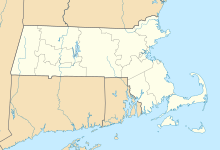New Bedford Whaling Museum
 |
|

New Bedford Whaling Museum and New Bedford Harbor
|
|
| Established | 1903 |
|---|---|
| Location | 18 Johnny Cake Hill, New Bedford, Massachusetts |
| Coordinates | 41°38′07″N 70°55′23″W / 41.63530°N 70.92318°WCoordinates: 41°38′07″N 70°55′23″W / 41.63530°N 70.92318°W |
| Collection size | 750,000 items |
| President | James P. Russell |
| Website | www |
The New Bedford Whaling Museum is a museum in New Bedford, Massachusetts, United States that focuses on the history of the international whaling industry and the "Old Dartmouth" region (now the city of New Bedford and towns of Acushnet, Dartmouth, Fairhaven, and Westport) in the South Coast of Massachusetts. The museum is governed by the Old Dartmouth Historical Society (ODHS), and its collections include over 750,000 items, including 3,000 pieces of scrimshaw and 2,500 logbooks from whaling ships, both of which are the largest collections in the world. The museum's complex consists of several contiguous buildings housing 20 exhibit galleries and occupying an entire city block within the New Bedford Whaling National Historical Park.
The museum also houses a collection of fine art, including works by major American artists who lived or worked in the New Bedford area, such as Albert Bierstadt, William Bradford, and Albert Pinkham Ryder, as well as a collection of locally produced decorative art, glassware, and furniture associated with the rise of New Bedford as a whaling port in the 19th century.
The museum's Bourne Building houses the Lagoda, a half-scale model of a whaling ship that was commissioned in 1916 and is the world's largest model whaling ship.
On January 7, 1903, Ellis L. Howland, a news reporter for the Evening Standard, presented a paper urging the establishment of a historical society and a museum:
I believe that the need of a historical society arose not recently but generations ago when the history of New Bedford and vicinity commenced. Today we are suffering from the omission and if it is in the least deplorable it will be doubly a breach of our duty toward posterity to allow the lack to exist any longer ... True, there are a few old log books stored away in the public library or here and there in the closet of some private collector, but when one contemplates the tons and tons of them that have been ground up into wrapping paper of prosaic fiber wash tubs, the absence of a historical society becomes in our minds almost a crime.
...
Wikipedia

